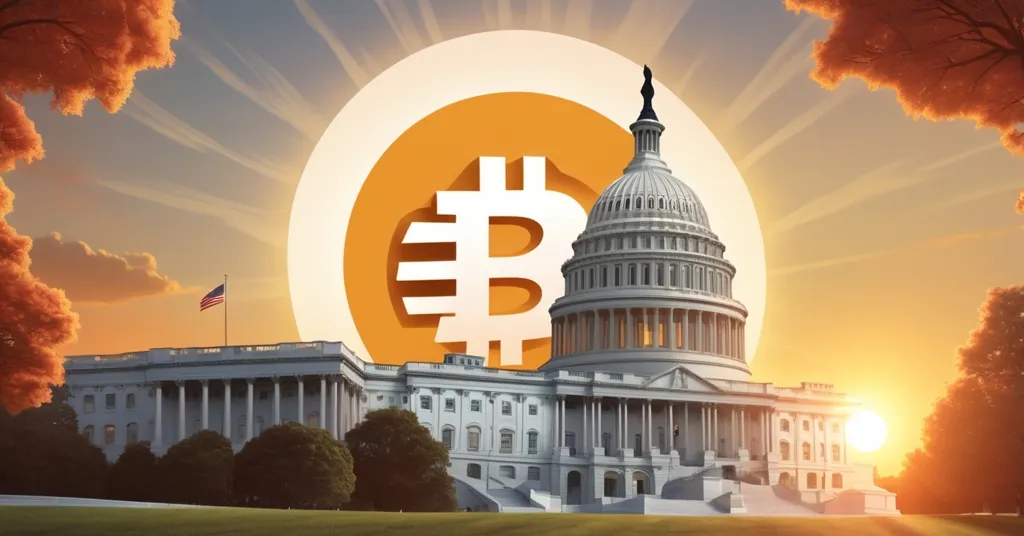Trump Backs 1M Bitcoin Reserve: Lummis’ BITCOIN Act Unveiled

Senator Lummis Reveals Trump’s Backing for 1 Million Bitcoin Strategic Reserve
Senator Cynthia Lummis has dropped a bombshell in the crypto world, revealing that former President Donald Trump supports her BITCOIN Act. This proposed legislation aims to establish a strategic reserve of 1 million Bitcoins for the U.S. government over the next five years. But what exactly is a strategic reserve? Think of it as a safety net or stockpile of Bitcoin held by the government to manage national debt and position the U.S. as a leader in financial innovation.
- BITCOIN Act proposes 1M BTC reserve
- Trump’s endorsement
- Impact on national debt and financial leadership
- Potential market dynamics
Trump’s Endorsement
Lummis, a vocal advocate for Bitcoin, expressed her enthusiasm for Trump’s support, stating,
“I’m particularly pleased with President Trump’s support for my strategic Bitcoin reserve initiative, which will address our national debt, while securing America’s position as the global leader in financial innovation.”
She believes that Bitcoin’s growing usage will enhance the security and robustness of the global financial system, positioning the U.S. as a leader in this space.
The BITCOIN Act, if passed, would mandate the U.S. government to acquire a staggering 1 million Bitcoins, adding to its current holdings of approximately 198,000 BTC, valued at around $19 billion—a modest start compared to the proposed reserve. At current prices, reaching this target would require an investment of roughly $76 billion. This ambitious plan aims to manage the country’s financial obligations and give ordinary Americans greater control over their money, as Lummis noted,
“Bitcoin puts ‘the everyday American and the everyday worker all over the world in control over their own money.'”
Impact on National Debt
But how would this work? The government would need to acquire these Bitcoins over five years, likely using funds allocated from the national budget. This move could help manage the country’s financial obligations, but it’s not without its challenges. While the BITCOIN Act could revolutionize U.S. financial strategy, it’s crucial to scrutinize its potential pitfalls.
Market Dynamics
The potential acquisition of such a large amount of Bitcoin raises questions about market dynamics. With Bitcoin’s supply capped at 21 million, the cryptocurrency is considered illiquid, meaning it can’t be easily bought or sold in large quantities without affecting its price. The U.S. government’s entry into the market could significantly drive up Bitcoin’s price, as it competes with other major investors. For instance, Strategy, a major investor, has plans to invest $84 million in BTC, illustrating the growing institutional interest in the cryptocurrency. For more on this, see the impact of large-scale Bitcoin purchases on market liquidity.
Counterpoints and Challenges
While the prospect of a Bitcoin strategic reserve is exciting, it’s crucial to consider both sides of the coin. On one hand, it could position the U.S. as a leader in financial innovation and potentially stabilize the national debt. On the other hand, the sheer scale of the acquisition could disrupt the market, potentially benefiting early Bitcoin holders but posing challenges for new entrants. As we champion decentralization and the disruptive potential of cryptocurrencies, it’s essential to balance this enthusiasm with a critical eye on the practical implications of such a policy.
Moreover, the idea of a government amassing a significant portion of a decentralized currency like Bitcoin seems somewhat paradoxical. While it could signal mainstream acceptance, it also raises concerns about the concentration of power. As Bitcoin maximalists, we must ask whether this aligns with the ethos of decentralization and privacy that many in the community hold dear. The government turning the dream of financial freedom into a centralized nightmare? That’s a hard pill to swallow for many in the crypto space. For further analysis, see criticism of government Bitcoin reserve policy.
Broader Implications
As we navigate this complex landscape, it’s clear that Bitcoin and other cryptocurrencies continue to push the boundaries of what’s possible in finance. The BITCOIN Act is just one of many developments that highlight the growing intersection of politics, economics, and technology in the crypto space. It’s a testament to the disruptive power of these technologies, but also a reminder of the challenges they present.
The Trump administration’s shift towards pro-crypto policies, including the initial proposal for a multi-currency strategic reserve, underscores the evolving regulatory environment. This shift could facilitate the implementation of initiatives like the BITCOIN Act, but it also raises questions about the use of taxpayer funds and the broader economic impact on ordinary Americans. For more on Trump’s stance, see Donald Trump’s stance on Bitcoin and cryptocurrency.
Key Questions and Takeaways
- What is the BITCOIN Act and what does it propose?
The BITCOIN Act is a legislative proposal by Senator Cynthia Lummis that mandates the U.S. government to acquire 1 million Bitcoins over five years to establish a strategic reserve, aiming to address the national debt and position the U.S. as a leader in financial innovation. For more details, see the BITCOIN Act strategic reserve.
- Who supports the BITCOIN Act according to Senator Lummis?
According to Senator Lummis, former President Donald Trump supports the BITCOIN Act. For more on this, see Senator Lummis claims Trump supports 1M Bitcoin strategic reserve bill.
- How does Senator Lummis believe Bitcoin benefits ordinary Americans?
Senator Lummis believes that Bitcoin benefits ordinary Americans by giving them control over their own money, enhancing the security and robustness of the global financial system.
- What are the potential market impacts of the U.S. government acquiring 1 million Bitcoins?
The acquisition could significantly increase Bitcoin’s price due to its relatively illiquid supply, requiring the U.S. government to invest around $76 billion at current prices and compete with other major investors. For more insights, see Bitcoin market dynamics and government acquisition.
- How much Bitcoin does the U.S. government currently hold?
The U.S. government currently holds approximately 198,000 Bitcoins, valued at around $19 billion.



